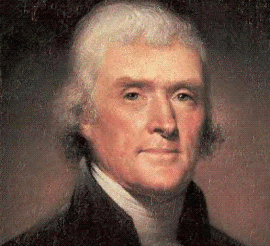
There was a fascinating debate on the radio this evening comparing the political philosophies of Alexander Hamilton and Thomas Jefferson. Both were important figures in the American revolution and the constitutional debate that followed. Alexander Hamilton is valued particularly as one of the earliest and most important advocates of the federal idea.
Jefferson was portrayed as an idealist for the small state, where government takes a low profile in the interests of strong, confident citizenry. Hamilton, on the other hand, advocated strong, central institutions of government at the federal level. Only through effective government and the rule of law, he said, could freedom of the individual be assured.
The intriguing element of the debate was the notion that they were both right and that the American political system expresses elements of both philosophies. There was an argument that was critical of Jefferson in that he did not live up to his own principles. He famously wrote the American Declaration of Independence, which reads “We hold these truths to be self-evident, that all mean are created equal”, but he himself owned slaves and did not think that women should have the right to vote. He was the product of, and defender of, a very aristocratic notion of democracy: strong, confident citizens could only be strong and confident if they had the necessary wealth. Democracy was, in effect, only for the rich.
Hamilton, on the other hand, was much more nearly a self-made man. His vision of democracy was more egalitarian but his vision brought with it the need for an active government. Keeping that government in check becomes then a principle task of politics. Perhaps part of what fuelled Jefferson’s idea was the notion that one of the triggers for the American revolution itself was popular resentment of a faraway government that imposed burdens on the citizens. The American political system should not replace what George III had had rejected.
What particularly intrigued me was that, in addition to the two academics who led off the debate, there were contributions, impassioned contributions, from two others, Bonnie Greer (for Jefferson) and John Redwood (for Hamilton). Even better, the discussion strayed into the issue of Europe, but, I suppose because this was intended to be a discussion about America (the two academics were both experts on American political history), the best questions about Europe were not put.
John Redwood, of course, is better known as a prominent Eurosceptic, so it was a rare pleasure to hear him supporting the arguments of a federalist. Specifically, his argument centred on the importance of the rule of law. Margaret Thatcher, he said, would always insist that freedom was not possible without it, and she was right. When it came to Europe, though, he said there was no demos and that therefore democracy was not possible. In America, there was, so it was.
This seems fine, but it doesn’t go far enough. Let’s go back to something Hamilton wrote (in Federalist Paper number 6 published on 14 November 1787 (read it here) and reprinted on the cover page of each issue of The Federalist from Pavia):
“To look for a continuation of harmony between a number of independent unconnected sovereignties situated in the same neighbourhood, would be to disregard the uniform course of human events and to set at defiance the accumulated experience of ages.”
Nothing about a demos, there; all about the rule of law. If we want peace in Europe, if states and citizens are to be free, we need an international rule of law. That’s what European integration is seeking to create, although in his writings on Europe, John Redwood seems slow to accept it.
The demos point needs to be dealt with, though, and this is where Jean Monnet’s notion of building Europe by stages comes in. Over time, as the citizens of Europe in their different countries get more and more used to working together, more and more can be done together. At any one time, the state of European integration is a compromise between the desire for more integration and the reluctance to concede it. Often, people search for perfection in political systems – and the politicians responsible for those systems do nothing to discourage them – but actually nothing is perfect.
An important distinction that John Redwood drew between America then and Europe now was that the American states then faced common threats (Britain, France, Spain) which the European countries now do not. I don’t know if he has been following the news about the fears of a Europe-wide gas shortage (a quarter of UK gas comes from the European network), and I don’t think that the British people have some kind of in-built immunity to avian flu, and we certainly aren’t going to escape the effects of climate change in our small, crowded island. These are common threats, and I think that the people and the countries of Europe do indeed need a common Hamiltonian political system in order to face them.
The programme will be broadcast again on Saturday 7 January at 10.15 pm on Radio 4 FM. You can read about it here http://www.bbc.co.uk/radio4/greatdebates/pip/qswjp/ and I’ll post a comment if there is a link where the programme can be heard on the web.
